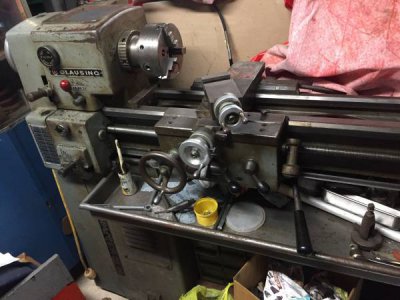- Joined
- Jan 10, 2019
- Messages
- 1,042
To the OP, you keep saying that the ELS will run $150. That may be, if the gears, belts, and motor aren't included in the number. I built the Clough42 ELS and it was about $350 once fully complete. My point is, don't delude yourself on what the extras cost, some of which aren't optional. It'll be a lot if you buy good quality tools.
As another data point on lathes, I got a Takasawa TSL-800 for $1500, a 5-hp, 2,500 lb beast, but with its 32" bed, it fit in the same space that my Grizzly 12x36" took up. It also didn't come with much tooling, but that's a double-edged sword. People will tell you that a lathe isn't a good deal unless it comes with tooling... the assumption is, good tooling. Mine came with a QCTP that was tired out and an 8" Buck chuck that was not only worn and beat up, but one that had no parts available. So I paid for extras that didn't work out, which was a waste on my part.
Another hidden cost is getting it from the seller into your shop. The first place I contacted wanted around $1,000 to move it 4 miles, and the second place was more reasonable, but still $300. My point is, your "$1,500" lathe isn't that unless you move it. Again, don't delude yourself on the expense of the whole entire package and go into it with your eyes open.
The deal you ultimately find all comes down to how patient you are. Worst thing of all: falling in love with a machine that you just have to have.
As another data point on lathes, I got a Takasawa TSL-800 for $1500, a 5-hp, 2,500 lb beast, but with its 32" bed, it fit in the same space that my Grizzly 12x36" took up. It also didn't come with much tooling, but that's a double-edged sword. People will tell you that a lathe isn't a good deal unless it comes with tooling... the assumption is, good tooling. Mine came with a QCTP that was tired out and an 8" Buck chuck that was not only worn and beat up, but one that had no parts available. So I paid for extras that didn't work out, which was a waste on my part.
Another hidden cost is getting it from the seller into your shop. The first place I contacted wanted around $1,000 to move it 4 miles, and the second place was more reasonable, but still $300. My point is, your "$1,500" lathe isn't that unless you move it. Again, don't delude yourself on the expense of the whole entire package and go into it with your eyes open.
The deal you ultimately find all comes down to how patient you are. Worst thing of all: falling in love with a machine that you just have to have.
Last edited:




